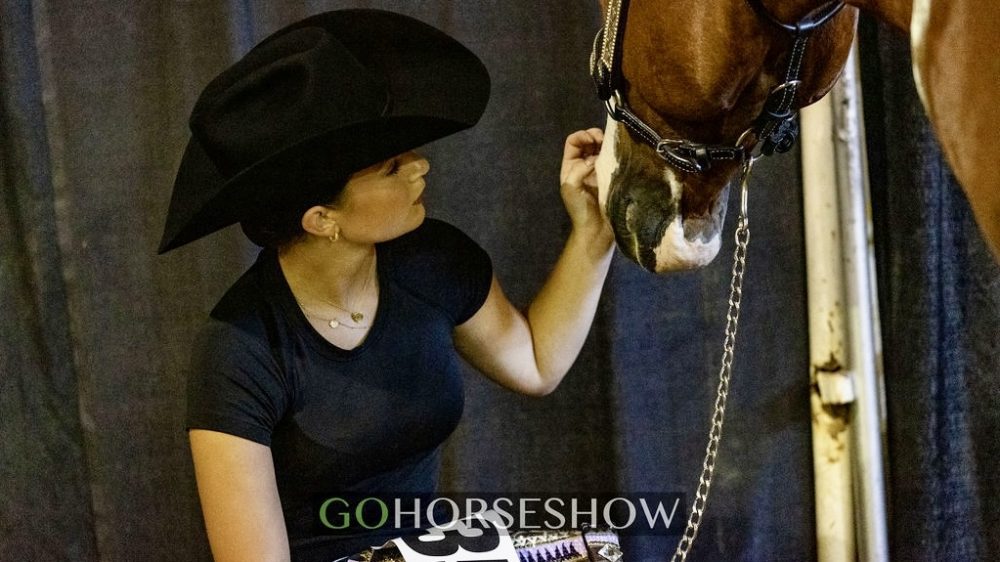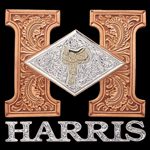One recurring piece of advice we consistently hear from our experts is that it is important to know your horse. An accurate and fair analysis of your horse’s strengths and weaknesses allows you to better target your practices, set attainable goals, and create show plans which emphasize your horse’s good traits, while minimizing their poor qualities.
However, riding is a team event and the horse isn’t the only one that should be honestly evaluated prior to setting show goals and plans. The rider is the pilot in the partnership and, therefore, it is important to also know yourself and how your personality strengths and weaknesses impact your overall experience.
We decided to delve into the psychology of personality types to compile psychological advice on how to promote a positive experience that is tailored to your own mental strengths and weaknesses.
For our purposes, we are relying on the Friedman/Rosenman expanded model of four major personality types: A, B, C, and D.
Type A Personality (The Go-Getter)
Perhaps the most commonly–referenced personality type, people known as “Type A” are characterized by their go-getter attitudes. These people tend to be ambitious, competitive, motivated, passionate, stubborn, and natural-leaders.
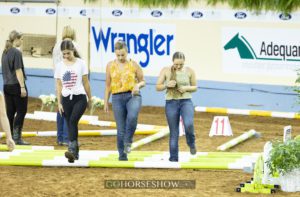 However, as a result of their highly-motivated personality, these people are more prone to becoming over-stressed, over-stimulated, and easily-angered when things don’t go to plan.
However, as a result of their highly-motivated personality, these people are more prone to becoming over-stressed, over-stimulated, and easily-angered when things don’t go to plan.
When it comes to competition, therapists advise that one of the biggest issues for Type A people is their struggle to relinquish control. Showing horses is all about teamwork and, at the highest levels, it tends to involve three parties: the rider, the horse, and the trainer. Therefore, to find success, Type A people need to remind themselves to let the trainer be the trainer.
The best way to fulfill your personality needs while giving the trainer the necessary control is through clear, respectful communication. Type A personalities need to be open and honest about their goals, their needs from the trainer, and they need to be willing to take advice that may not fit in their anticipated plan of action.
Additionally, Type A riders need to realize that their horse isn’t in on the plan because, frankly, horses don’t make plans. Therefore, when things go awry, it is important not to take out your frustrations on your horse, who isn’t on the same page as you. Allow yourself to deal with the frustrations and then make a new plan for tackling the issues that will inevitably arise in competition.
Ultimately, by communicating your goals and frustrations, you give your trainer the opportunity to work with you and your horse to develop a plan to put you in the best position to attain those goals and avoid repeated frustrations.
Type B Personality (The Socializer)
These people are known as fun-loving, friendly, charismatic, extroverts. These “people-persons” tend to struggle with impatience, impulsive decision-making, and sticking to a schedule.
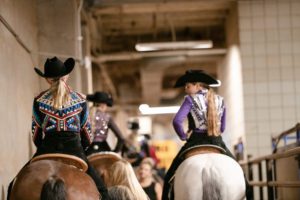 One of the biggest issues for these social butterflies is that it can be too easy to jump from flower to flower, which distracts from your ultimate goal. These people may have problems sticking with a horse for very long or staying with a trainer through difficult seasons.
One of the biggest issues for these social butterflies is that it can be too easy to jump from flower to flower, which distracts from your ultimate goal. These people may have problems sticking with a horse for very long or staying with a trainer through difficult seasons.
The best advice for the Type B rider is to understand which needs you are hoping to meet in the two most important relationships in your show career: the relationship with your horse and the relationship with your trainer.
If your horse isn’t meeting your relationship needs, what are you frustrated by and is it something that can be improved with time and practice? If your frustration lies with your trainer, is it something that can be fixed with open communication? Horse showing is a journey and, while there are certainly good reasons to change horses or barns, such decisions shouldn’t be made lightly.
Additionally, this personality can struggle with focusing at shows – indeed, there is so much to enjoy: watching classes, socializing, and shopping! To avoid the stress of last-minute scrambling, it can be helpful for these riders to set a clear schedule for practices and when to prepare their horses. To fulfill your social needs, make sure to also set aside time for shopping and catching a meal with friends.
Horse showing is about having fun, but not at the expense of your horse’s preparation or your trainer’s schedule with other clients.
Type C Personality (The Thinker/Perfectionist)
These people are known for being dependable, independent, highly organized, and analytical. However, they struggle with appearing anti-social or detached, and they also tend to over-analyze failures without celebrating their successes.
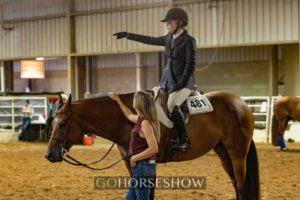 This personality likely suffers the most from over-analyzing goes. While trainers often advise that you watch videos of your rides to figure out what was done well and what needs work, dwelling on a past go can be counter-productive to future rides – what is done is done.
This personality likely suffers the most from over-analyzing goes. While trainers often advise that you watch videos of your rides to figure out what was done well and what needs work, dwelling on a past go can be counter-productive to future rides – what is done is done.
Therefore, the thinkers need to actively remind themselves to spend just as much time enjoying the positives aspects of their goes as they spend working on fixing the negatives. The goal in this practice is to avoid developing a pessimistic mindset about yourself and your horse.
These riders can also benefit from consistent, correct practice in order to avoid complications from over-thinking things in the arena. By practicing often and making certain maneuvers habitual, it will prevent these riders from being “too in their own heads” in the middle of a ride, especially during pattern classes.
Type D Personality (The Supporter)
These people are known as caring, sincere, and observant individuals. They typically have a calm nature and aren’t prone to respond angrily to stressful situations.
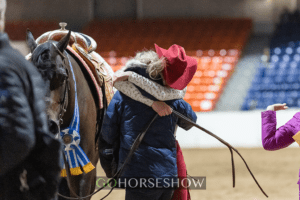 However, they are also known to be less assertive and tend to spend more time supporting others, while struggling to request support for themselves. These people tend to be easily hurt and resistant to change.
However, they are also known to be less assertive and tend to spend more time supporting others, while struggling to request support for themselves. These people tend to be easily hurt and resistant to change.
There are two areas where these exhibitors are likely to struggle most: disciplining bad or dangerous behavior in their horse and communicating their own needs in a group setting.
While nearly all horse-lovers struggle with how to effectively and fairly discipline their horse, this can be particularly difficult for the supporters. Horses know who they can take advantage of, so these riders need to make sure they are directing the horse and that the power dynamic isn’t reversed – even very broke, kind horses can become unsafe in the wrong hands.
Therefore, these riders need to speak with their trainers about effective, respectful discipline to ensure that their horse doesn’t walk all over them…sometimes literally.
Finally, these riders also should remind themselves that they need to speak up on their own behalf. Most trainers have multiple clients and limited time. It can be easy for the other personalities to dominate a trainer’s time simply by being demanding – the squeaky wheels get the grease – while the supporters sit on the sidelines.
To avoid unintentionally falling off your trainer’s radar, make it a point to communicate your needs before you suffer from hurt feelings over lacking attention. Horses and trainers cannot read your mind. If you need something from either one, you have to ask.
***
Which major personality type are you? Perhaps you share traits with a couple personalities (which is common)?
Remember, you are an active participant in determining whether your showing experience is a positive one. Give yourself credit for what you do well and where your strengths lie, but don’t forget to be aware of your weaknesses and how you can address them to make your experience the best it can be.
“Knowing yourself is the beginning of all wisdom.” – Aristotle


